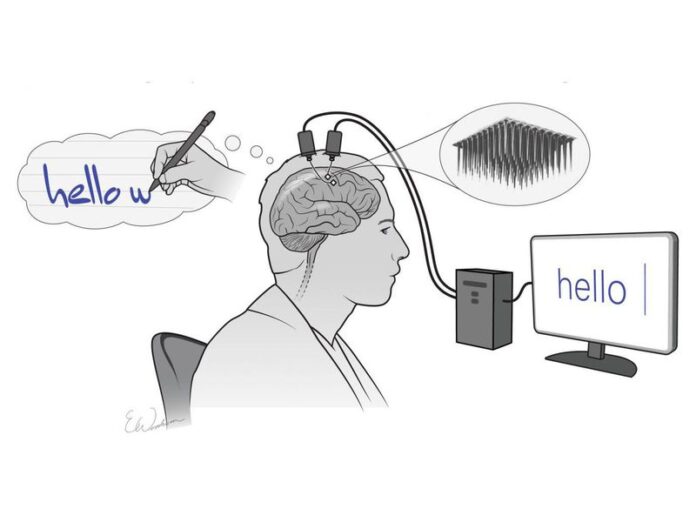Losing the ability to speak due to multiple reasons significantly affects one’s life as you will be no more able to communicate with others and you cannot tell them what you want.
Science and technology are still evolving to overcome this situation for people who are not able to speak, and they try to compensate for this through technology by making a new way that enables people to translate what is in their mind without speaking
In a recent study; A group of scientists has been able to translate brain activity into written texts for people who are paralyzed and who have lost the ability to speak due to medical reasons, such as stroke or amyotrophic lateral sclerosis.
People with these conditions retain their language abilities, but the paralysis loses them the ability to control muscles and speech or use technological means to communicate.

How Scientists Performed this Study?
Neuroscientists at the University of California, San Francisco, implanted an array of electrodes into the sensorimotor cortex, the part of the brain that controls speech, in a 36-year-old who had a brainstem stroke since the age of 20. Severely paralyzed and visibly lost the ability to speak. The electrodes were also implanted in a group of healthy volunteers.
The Scientists Used Artificial Intelligence
Deep learning algorithms to train computer models to recognize and classify words from patterns in a participant’s brain activity.
Natural language model, a program that predicts the next word in a sentence based on previous words.
Then they asked the man who was unable to speak to think about saying the words they gave him on the screen.
In each experiment, the participant was presented with a sentence to try to generate the words as quickly as possible by thinking about what they were saying.
Over the course of 48 training sessions, the participant attempted to produce specific words from a set of 50 words. During these sessions, the researchers collected 22 hours of brain wave data.
After training, the algorithm was able to correctly identify 98% of the participant’s attempts to produce individual words.
Read Also: Genomics in Healthcare: Transforming the Understanding of Diseases and Care Delivery
Read Also: Using Virtual Reality in Medical Procedures to Alleviate Patient Discomfort
Read Also: New Face Mask That Detects Coronavirus Infection
The Model is Enhanced with Learning
The man could utter grunts and moans but was unable to pronounce words, despite having healthy cognitive functions.
The patient was able to control a computer-based writing device to communicate using slight movements of his head, but his typing speed with this device was only five correct words per minute.
After 48 training sessions using the new mind-reading technique over 81 weeks, he was able to type about 15 words per minute, with an error rate of 26%.
Scientists, who report on their findings, say that speech decoding techniques are generally considered usable if a person has a word error rate of less than 30%.
Dr. Lee Schwamm, who chairs the advisory committee of the American Stroke Association and was not involved in this study, said that this study is a huge leap for decoding words.
It was considered that the most surprising thing in this study is that the area of the brain is implanted with sensors (the sensorimotor cortex area), as it was widely believed that it does not play an important role in understanding language or generating words.

